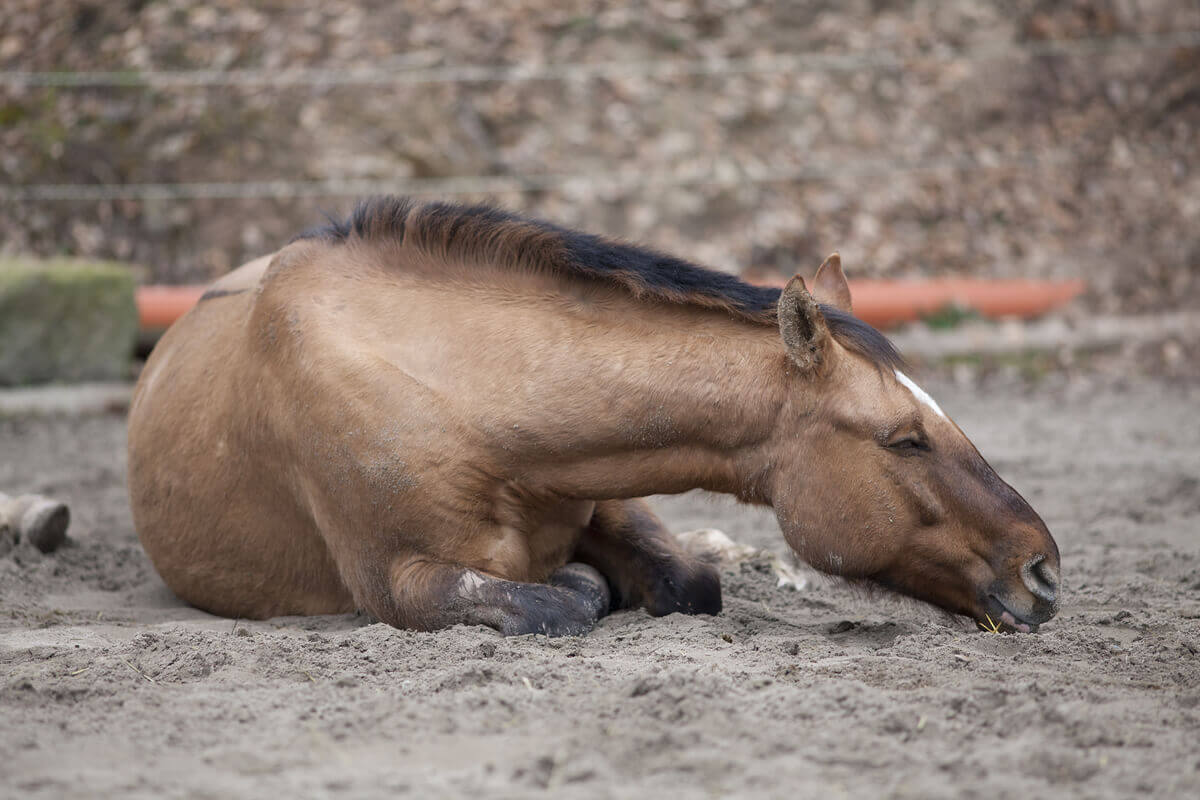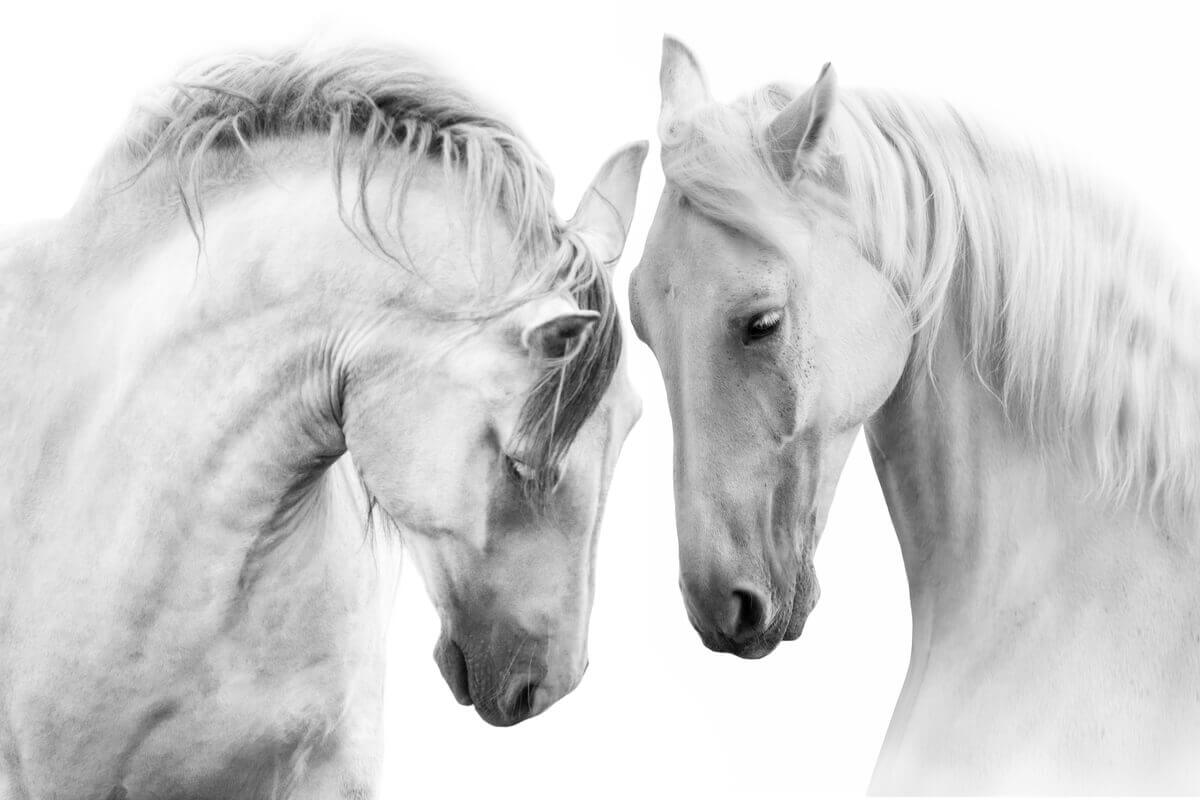The Prevention and Early Detection of Colic in Horses

Colic in horses is a very frequent problem and is one of the main causes of death. This is especially true when the condition goes undetected or untreated. Therefore, the prevention and early detection of colic in horses is extremely important.
It’s worth mentioning that, despite the efforts of caregivers, colic can still often occur. The truth is, this species is very sensitive to a wide variety of variables. What’s more, their anatomy and physiology don’t help when it comes to recovery. So, if you notice any signs of this illness, it’s best to seek the help of a professional right away.
The general approach to colic in horses
Colic refers to acute pain in the belly due to spasms in the muscles around the affected organ. Not every case has to do with the viscera of the digestive system (see renal colic, for example). However, when we refer to colic in horses, it usually has to do with the digestive system, be it the stomach or the intestine.
People who know about horses know perfectly well how serious these illnesses can be. It may be because they had to treat a horse for colic, or because their horse died from colic without them knowing.

Is there a predisposition in this species when it comes to colic?
Yes. There are various reasons why this tendency exists, including the following:
- Their anatomy: Horses have a relatively small stomach, meaning their gastric transit is very fast. Therefore, throughout the day, they send food to the intestine with insufficient digestion levels.
- Feeding errors: This has to do fundamentally with the quality and quantity of their food. What’s more, horses are very sensitive to abrupt changes in their diet.
- Poor handling: Excessive exercise or drinking very cold water, among other things.
- The presence of other ailments or illnesses, especially stomach or intestinal disorders.
- Chewing defects: Ideally, horses should chew slowly and carefully. What’s more, their mouths should be healthy and their teeth in perfect shape.
And most importantly: Horses can’t vomit because their digestive tract won’t allow it. So, they can’t relieve discomfort by emptying their stomach context. To compensate, their stomach begins to dilate and can even come to burst, causing peritonitis.
The early detection of colic in horses
First of all, it’s important to observe animals for a few minutes to see if you notice anything strange. Pay attention to their overall condition, behavior, and attitude. During spasms, horses may seem restless, moving constantly, and tend to scratch the ground.
In general, they shift their position constantly and look anxiously at their sides. They may also lie down carefully–or even abruptly–and roll around.
Other perhaps more evident signs include:
- An increase in the volume of the abdomen
- The presence of uneaten food in the trough
- Chances in the consistency of bowel movement, or even the total absence of defecation and urination
- Sweating for no apparent reason
If the early detection of colic in horses doesn’t take place and the condition isn’t treated quickly, it can produce a serious electrolyte imbalance. This, in turn, can lead to shock and the horse’s death.
What should you do if you suspect a horse has colic?
This is a serious illness and it’s likely to produce an emergency situation for the animal. Therefore, the early detection of colic in horses, as well as early intervention, are both essential in preventing possible complications.
A veterinarian will determine the right course of treatment–medication of surgery–by means of a clinical exam. Early diagnosis is a fundamental key element in preventing the deal of the animal.
How to prevent colic in horses
As with any illness, the key is to prevent the causes that can lead to symptoms .
As we mentioned already, there are many possible causes that vary greatly from each other. For example, you may need to fix the horse’s teeth and treat the animal periodically for gastrointestinal parasites. You should also carefully control your horse’s diet, keeping in mind their sensitivity to abrupt changes.

What prognosis is there for horses with colic?
The prognosis will depend on a variety of factors, including the following:
- The cause. Do you know the cause? Is it serious? Have you been able to resolve it?
- How soon you detect the first symptoms.
- The early treatment of colic by means of a veterinarian prescribed treatment.
- How well the animal responds to treatment (unfortunately, this is beyond our control).
- The reestablishment of the animal’s gastrointestinal physiology.
- The appearance of complications: compromised blood circulation, shock, the bursting of viscera, etc…
Just the same, despite the efforts of owners and veterinarians, colic is the main cause of mortality in horses.
All cited sources were thoroughly reviewed by our team to ensure their quality, reliability, currency, and validity. The bibliography of this article was considered reliable and of academic or scientific accuracy.
- Cruz AJ. Aproximación al diagnóstico del cólico equino [Internet]. 2006 [consultado el 16 de junio de 2020]. Disponible en: http://www.produccion-animal.com.ar/
- Genoud JM. Cómo prevenir y detectar cólicos [Internet]. 2002 [consultado el 16 de junio de 2020]. Disponible en: http://www.produccion-animal.com.ar/
- Genoud JM, Moiron AI, Kudzujián M. Diagnóstico precoz del abdomen agudo en equinos [Internet] [consultado el 16 de junio de 2020]. Disponible en: http://www.produccion-animal.com.ar/
